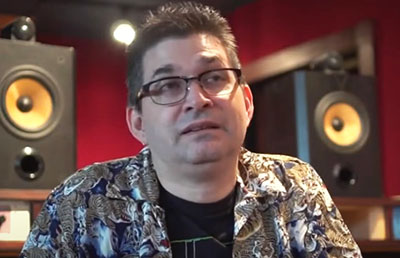by WorldTribune Staff / 247 Real News May 9, 2024
Steve Albini, a long-time indie rock producer and performer, died suddenly of a heart attack on May 7, staff at his recording studio Electrical Audio confirmed to Pitchfork. He was 61.

Albini’s death was unexpected as he was preparing to tour as the frontman for the band Shellac. Shellac’s first album in a decade, To All Trains, is scheduled for release next week.
When asked how his career would be regarded if he ever retired, Albini recently told The Guardian: “I don’t give a shit. I’m doing it, and that’s what matters to me—the fact that I get to keep doing it. That’s the whole basis of it. I was doing it yesterday, and I’m gonna do it tomorrow, and I’m gonna carry on doing it.”
Albini was also an advocate for the Covid vaccine.
Pitchfork noted: “Albini was a legend of the recording studio, though he preferred the term ‘engineer’ to ‘producer.’ He recorded Nirvana’s In Utero, Pixies’ Surfer Rosa, PJ Harvey’s Rid of Me, and countless more classic albums, and remained an outspoken critic of exploitative music industry practices.”
Albini was a controversial figure as Pitchfork noted he was linked to provocative band names (Rapeman, Run N***er Run), song titles ( “Pray I Don’t Kill You F***ot,” “My Black Ass”), and offhand statements (“I want to strangle Odd Future”). While he refused to apologize for his choice in names and jokes, in Michael Azerrad’s 2001 book Our Band Could Be Your Life, Albini made it clear that he believed his real stances on race, gender, LGBTQ rights, and politics were obvious. “I have less respect for the man who bullies his girlfriend and calls her ‘Ms’ than a guy who treats women reasonably and respectfully and calls them ‘Yo! Bitch,’” Albini told Azerrad. “The point of all this is to change the way you live your life, not the way you speak.”
Later in life, Pitchfork noted, Albini repeatedly apologized for his past controversies, realizing that intent and moral clarity went only so far.
“A lot of things I said and did from an ignorant position of comfort and privilege are clearly awful and I regret them. It’s nobody’s obligation to overlook that, and I do feel an obligation to redeem myself,” Albini wrote on X in 2021. “If anything, we were trying to underscore the banality, the everyday nonchalance toward our common history with the atrocious, all while laboring under the tacit *mistaken* notion that things were getting better. I’m overdue for a conversation about my role in inspiring ‘edgelord’ shit. Believe me, I’ve met my share of punishers at gigs and I sympathize with anybody who isn’t me but still had to suffer them.”
You’re absolutely right. I think you’re idiots seduced by a buffoon. I detest your delusional world view and the way it harms people who deserve sympathy and protection. I think you are a fucking cancer.
And I desperately want you to stay safe and get a free life-saving vaccine.
— regular steve albini (@electricalWSOP) September 11, 2021
There is some risk to us, and though we are vaccinated we all still behave defensively and keep our distance, but knowing we could be the reason people congregate and subsequently get infected weighs on us.
— regular steve albini (@electricalWSOP) August 16, 2021
